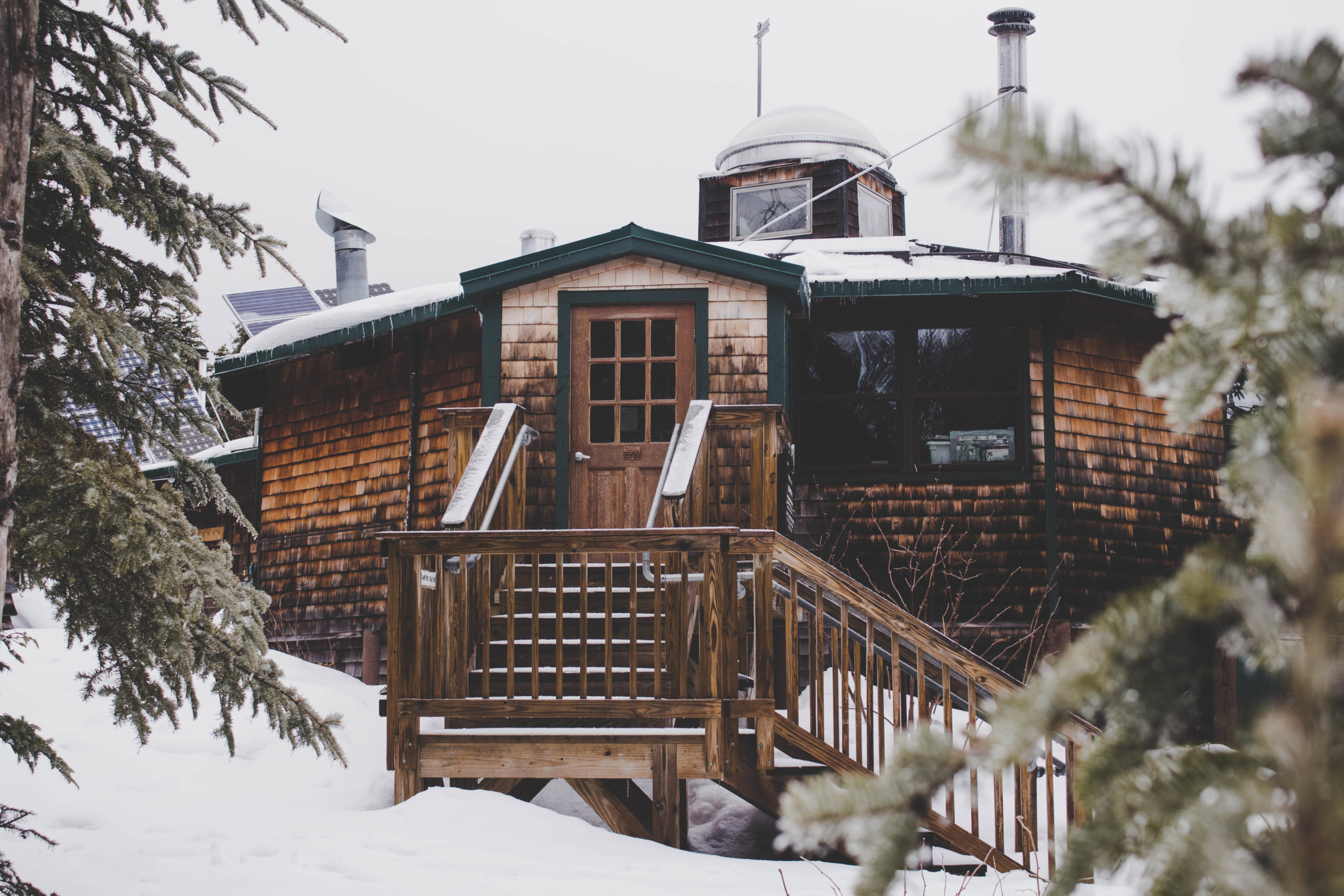

Staying overnight at an AMC hut is a fun and enjoyable way to experience the White Mountains. Of the eight huts, three (Lonesome Lake, Zealand Falls, and Carter Notch) are open during the winter months for a self-service option, providing a roof over your head and a bed to sleep on, albeit without the warm croo-cooked meal that you may experience in the summer. Instead, guests bring their own food and use the hut kitchen to cook.
If you are planning to stay at an AMC hut this winter, here’s some important information to help you prepare.
What should I pack for my stay at the hut?
All of AMC’s winter caretakers advise guests bring a 0-degree rated sleeping bag for a winter hut stay. The woodstove will not run overnight, and at Lonesome Lake and Carter Notch huts the guest bunkrooms are separate buildings with no heat source beyond body heat. Pillows and blankets will not be supplied.
Be sure to pack plenty of layers, including extra socks and clothes to wear once you arrive at the hut. Drying hooks and racks are available, but also are communal so be respectful of the space your party needs. For more details on what to bring, read here.
What are the trails like leading up to the hut?
Trail length varies depending how you approach the hut. Depending on the weather, you may encounter fresh snow and need to break trail, or you may find that job is already done. Be sure to check the weather before your trip to determine if it is safe to hike and follow these instructions on how to prepare for a winter hike before heading out.
What should I expect when arriving at the hut?
Each hut has a caretaker. The caretaker will always be at the hut by 4 p.m. but may venture out during the day for a hike or to explore the area. Upon arrival, if the caretaker is present, please check in with them to get an orientation to the space and prep yourself for how many other guests may be sharing the hut with your group that night. If the caretaker is away, please make yourself at home, but minimize your footprint both within the hut’s common space and the bunk spaces—the caretakers may have bunk assignments for managing large groups, so it is always advisable to speak with them and remain flexible to share the common space. We advise arriving at the hut before nightfall for both acclimation to the site and out of respect for other guests.
How cold will it be inside the hut?
Expect the inside temperature of the hut to be the same as the outside temperature, maybe 5 degrees Fahrenheit warmer. There is a woodstove in the common space of each hut, but the buildings are still uninsulated structures, and lose heat fast. The woodstove only runs from 4 p.m. to lights out, and the sleeping areas are fully unheated and uninsulated. For fire-permit reasons, the caretaker is the only person allowed to operate the woodstove. There are no woodstoves in guest bunkrooms.
How many people will be at the hut?
It varies—Carter Notch holds 40 people, while Zealand holds 36, and Lonesome Lake holds 48. We ask that everyone be respectful of other groups sharing the space—a backcountry bridal shower and a 5th grade hiking club may have different expectations for their night in the same hut, but everyone can do their best to make it a good time for all.
Will there be drinking water at the huts?
Potable water is available at each hut, but it must be boiled before drinking. During you stay, guests are reminded to practice good water conservation to minimize waste, and please be patient with the process of getting adequate supplies of potable water.
Are bathrooms available at the huts?
Yes, each hut has composting toilets. Water is not available in bathrooms, but hand sanitizer is provided.
When can I use the kitchen?
Guests sign up for a time in the kitchen for cooking and cleaning, the caretaker will supervise and guide kitchen use and washing up.
Where can I get accurate weather forecasts before my trip?
We advise you check the AMC weather page for a daily report from the hut, starting a few days before your trip, and for surrounding area conditions and higher elevation predictions, check the Mount Washington Observatory. Checking the Mount Washington Avalanche forecast is not a bad idea either—while avalanches are highly unlikely at the three winter huts, it doesn’t hurt to know more about snow science and mountain weather.
What other safety tips should I consider before my trip?
We strongly recommend that guests leave their plans, and a planned return time window, with friends or family before heading out on the trails. The huts in caretaker season are not well-equipped to handle hiker/guest safety beyond the hut itself. Be aware of the extra time and effort of winter travel, extra exertion of winter travel, and the shorter days.
Cell phone reception should be considered nonexistent at all huts, and there is not adequate electrical power for guests to charge their phones
AMC Caretakers are excited to see guests and welcome them to the winter huts. They love their jobs, and love seeing people getting out into the winter woods and hope this helps keep more folks happy, safe, comfortable, and confident when visiting a winter hut!